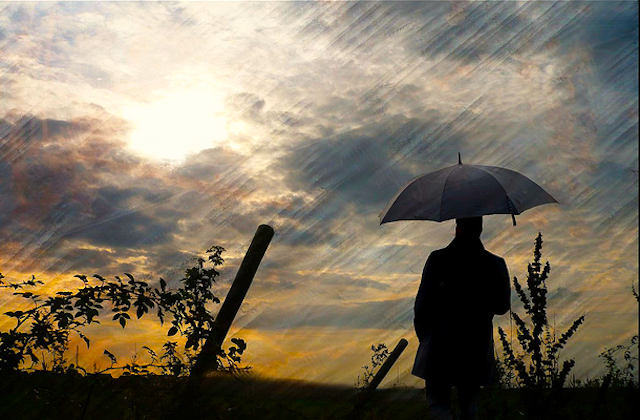
“The only way to make sense out of change is to plunge into it, move with it, and join the dance.” ~Alan Watts
I recently found myself ruminating about a difficult situation at my new workplace. Considering my high-flying, achievement-oriented personality, the recipe for my malcontent was predictable: A supervisor had disagreed with me, and I left work that day feeling melodramatic and like I wanted to quit… that day.
I thought, “I am so misunderstood. No one ‘gets’ what I am doing. I am not cut out for teamwork. Why do I hate working so much? I thought this job was the one. Will I ever find a job that satisfies my inner longings for connection and creativity?” And so on.
I wore the little thundercloud around my head all evening, until I remembered the birthday of a good friend and contacted her to wish her well. As we talked, we began to reminisce about her birthday the previous year, and our conversation viscerally triggered a flood of memories.
In the twelve months between her succeeding birthdays, I had left a toxic work environment, started a business with my husband, self-published a short book, launched a commercial website, and had also been accepted into my first-choice graduate program. Suddenly, my work conflict seemed a bit less dramatic.
I was left feeling humbled and filled with gratitude. Due to the nature of life itself—change—and with the help of significant work on my part, the current “weather” in my emotional life was only partly cloudy, not a hurricane. However, I had become so accustomed to my newfound peace that I expected perfection rather than stability.
I have often heard the emotional landscape compared to weather—we cannot control it, but we do have power over our reactions to it.
Rain is not a disaster if I remember to bring an umbrella… or don’t mind getting wet. Similarly, my conflict with my supervisor was a fluffy rain cloud scuttling across a generally blue sky—passing as quickly as it arrived, but not fast enough for me!
Being mindful of the transient nature of feelings and events is very important for our emotional health. I can summarize it in one phrase that has helped me tremendously: “Now is not forever.” Addressing this principle in my life has consisted of three primary concepts:
1. Embrace the evolving, shifting nature of life to help gain perspective instead of making generalizations.
When I am in the funk of a bad day (or month, or year), it is dangerously easy for me to create “Aha!” moments in which I diagnose the source of my most acute problems and focus all blame on people, places, and things. I can become surprisingly creative!
For me, perspective means adjusting my lens. Instead of allowing a difficult situation to consume my entire field of vision into eternity, I must gently remind myself that whatever is current will expire.
Also, because it is my tendency to externalize blame, it is important for me to welcome difficult situations as a part of my life’s journey.
These teachers, whether they are challenging work environments, personal relationships, or illnesses, are constantly in flux, for all of us. Our problems today will not be our problems next year.
2. Take mindful action.
When we take mindful action, we take advantage of opportunities to improve our lives.
Sometimes I suffer from one of life’s storms because I am unnecessarily subjecting myself to pain, as though I am standing outside in a hurricane and complaining about the wind!
Sometimes action can be tiny steps that transform your entire outlook. I have deeply developed my resilience through my practices—yoga and intentional self-work. These skills help me to weather tough times.
However, occasionally a situation calls for more dramatic change. For example, my former job was like a house with a leaky roof—every time it rained, I got hit with the deluge, and no amount of mindfulness or yoga could change that. Changing jobs was a positive way of acknowledging that I was not in control of my work environment, but I could choose to put myself in the best one possible.
3. Give service.
Sometimes we need to enlarge our world and our perceptions by putting our time, effort, and talents into improving the lives of others.
For me, service work both connects me to other people who share similar life wounds and reminds me to practice gratitude. When I move my focus from my own frustrations to helping others, whether it is volunteer work or simply meeting a lonely friend for coffee, I gain an expansiveness that calms my angst.
It makes my world bigger, but it’s not just about making my problems smaller. It’s about the power of connection.
Suffering may be part of the human experience, but our problems, flaws, and tragedies pull us closer to other people and to the divine.
Whether I struggle with the trauma of grief or the garden-variety frustrations of stress, giving to others reminds me that my individual story line intersects with thousands of others in a web of common experience, as well as common transcendence.
This—whatever this is—is not everything. But it is inevitable. Just as dark storm clouds roll across the horizon, experiences pass in and out of our lives with regularity and seeming unpredictability.
When we make the decision to embrace change, we give ourselves the gift of truly enjoying the present, because it is essential to remember that the sunny weather comes and goes, as well.
This year, when my reminiscence was sparked, my circumstances had dramatically improved, and I was reminded to be thankful for the positivity that currently surrounds me. I was able to see a small work conflict for what it was—a temporary cloud that would soon slide away, probably within a day. The sky is blue, warm, and waiting behind that cloud.
But next year when I call my friend for her birthday, she will be preparing to relocate across the country. I am not looking forward to her eventual absence, but when I accept change as a consistent part of life, I see the next twelve months with a renewed perspective.
The result is that I am inspired to celebrate the present, rather than cling to it, because, to be frank, what are my other options?
The story of my life is going to evolve with or without my permission, and I would prefer to be involved and engaged in its processes rather than unexpectedly find myself in an unfamiliar life that somehow changed form while I was looking away.
I cannot (nor can any other human on the planet) predict which days, months, or years will hold more sunshine than rain, or vice versa. But when we enlarge our perspective, engage in active participation, and give service to others, we allow ourselves to move with grace, wisdom, and resilience in the shifting emotional horizons of our lifetime.
Photo by eddi van w
About Rachel Trotta
Rachel Trotta is a personal trainer and coach living and working in NYC. She emphasizes holistic wellness, freedom from food addiction, and injury prevention through her company, Zenith Personal Training NYC. Check out her website, where you can find more information about personal training and coaching with Rachel. She also hosts an interval-running Meetup in New York City twice a week.













 Though I run this site, it is not mine. It's ours. It's not about me. It's about us. Your stories and your wisdom are just as meaningful as mine.
Though I run this site, it is not mine. It's ours. It's not about me. It's about us. Your stories and your wisdom are just as meaningful as mine.
Rachel- Well written, as you said, we have no idea what the future will bring, what we have is the present moment. If we constantly try to engage what is happening around our life now, life will be enjoyable with both ups and downs.
Thank you for reading! And I am happy that you highlighted the idea of the present – that has been a tremendous learning curve for me, and I think it is such a gift when we can embrace what is happening now.
I like the part where you wrote “Rain is not a disaster if I remember to bring an umbrella… or don’t mind getting wet.” It’s a good way to put things in perspective when dealing with the clouds and storms of life that sometimes come our way.
Thanks for your comment! I appreciate you reading and giving feedback. I still don’t love the storms and certainly don’t look forward to them, but part of my spiritual journey is learning that everything passes. Very tough for me! 🙂
So true…for me on a a literal sense, I love rainy days & the lightning/thunderstorms, those days makes me so nostalgic & gives me a certain mindfulness (except when it rains on an important tennis or cricket match…:P).
I love all the metaphors in this article. It’s going to help me remember all the nuggets of wisdom embedded in this post whenever I think of different weather.
Rachel – wow – this hits home really close! In the past 2 short years, I have accomplished so much, and yet, I’m not pleased about not reaching a certain goal, or still being stuck in a certain situation – in short, I’m carrying my own personal rain clouds. I write in my gratitude journal every day, for that day’s gifts (and bricks), and yet, I’m constantly striving and striding like a woman on a mission, rather than ENJOY today. Thank you for this reminder to live IN JOY more often 🙂
I think partly its also the world we are living in today…since our childhood, most of us are conditioned by our family & outside world to often strive for more & more for the so-called ‘successful life’ in order to find HAPPINESS & CONTENTMENT…ironically, many of us end up feeling less & less of ourselves no matter what we accomplish ‘externally as a result. Here is wishing you a more brighter next 2 years…:)
This was a beautifully written blog; def. helped me with clarity on a night in which it was much needed… Particularly enjoyed the words, “Suffering may be part of the human experience, but our problems, flaws, and tragedies pull us closer to other people and to the divine.” :-). Thank you for sharing.
I love this article. I’ve been coming back to it ever since I first google searched ‘letting go,’ and discovered it. I am having the hardest time getting over a past relationship with a guy I first loved but who lost interest in me and kept me in the limbo. This article hits home and makes me want to be a better person and genuinely heal. Also, yes, weathering through uncomfortable feelings is a lot like dancing in the rain. Embracing the change.